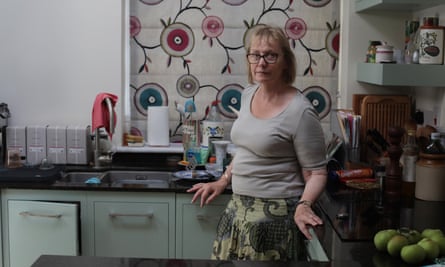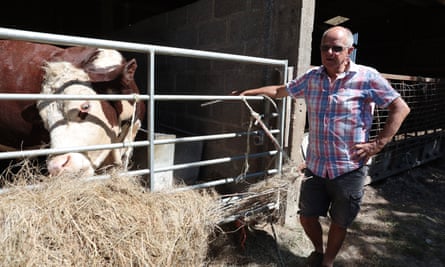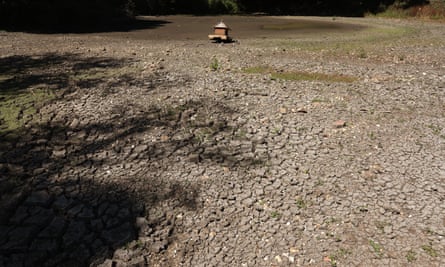Before Carolyn Evans set foot in the shower Wednesday morning, she set a five-minute timer as an emergency tanker outside supplied water. Not enough time, she discovered, to wash her hair as well.
For Evans, who has lived in the small village of Northend for 12 years, it’s anxiety inducing.
“This is the future, isn’t it?” said Evans, who has learned to be more economical with her water usage now she is in her 70s. “It’s not being strictly monitored enough, that company,” she added of Thames Water.
 View image in fullscreenCarolyn Evans, a resident of Northend. Photograph: Martin Godwin/The Guardian
View image in fullscreenCarolyn Evans, a resident of Northend. Photograph: Martin Godwin/The Guardian
This is the reality for the residents of the village, which straddles Buckinghamshire and Oxfordshire, who have been made reliant on water bottles and tank water in conditions described as “worse than camping”.
Stacks of bottled water and a tanker were seen in Northend, supplying local residents with water for everyday tasks that were suddenly upended: showering, flushing toilets and washing clothes.
“We realise how inconvenient this is, especially during such hot weather,” said a Thames Water spokesperson, who said the lower water pressure was due to technical issues at the nearby Stokenchurch reservoir. “Customers may experience lower-than-normal pressure during periods of higher demand. These times are typically in the morning and during the early evening.”
Britain is braced for another heatwave that will last longer than July’s record-breaking hot spell. Reservoirs are at record lows in some parts of the country, where rainfall has been below average and farmers are expecting to be told not to irrigate fields.
Thames Water, which operates in the area, apologised as temperatures in Oxford reached 30C on Wednesday and 68 customers were left without water.
It has been stressful for Supriya Biswas, who lives with her 96-year-old housebound husband who has had to forgo showers.
“The bottom line is that the water company has been negligent,” said Biswas. “When a crisis comes like this, it’s the community that suffers, the people that suffer, the taxpayer that suffers.”
Her daughter, Gina Brown, a radiologist, added: “A life-essential utility needs to be much more tightly regulated than it currently is.
“It’s worse than camping, as at least camping you have showers,.
Sign up to First Edition, our free daily newsletter – every weekday morning at 7am
A Thames Water employee at the site said the company has been there since Sunday, a problem he described as threefold: a drying water reservoir, insufficient water pressure and increased water demand.
“If there’s not enough water in the tank, we won’t get the pressure through. So we’re bringing water in from our two counties and we’re pressurising it into the system now,” he said.
“All we do is hope for some rain,” he added. “We just do what we can.”
 View image in fullscreenPeter Langford, a farmer in Northend, considered using bottled water for his cattle. Photograph: Martin Godwin/The Guardian
View image in fullscreenPeter Langford, a farmer in Northend, considered using bottled water for his cattle. Photograph: Martin Godwin/The Guardian
Peter Langford, a lifelong resident described the problem as “historical”, dating back to 2018. This particular dry spell began on 8 July, said Langford, who also went without a shower for a couple of days.
“And so, we then begin to think: Well, hang on a minute, is this just an indication of Thames Water’s failure in infrastructure investment? Is this just a microcosm of what’s going on elsewhere in the country?”
Local residents had been using the water bottles left in the sun by the water company to flush toilets, said the 69-year-old farmer. At one point he had considered using the bottles to fill the water troughs for his cattle.
 View image in fullscreenThe village pond and duck house in Northend. Photograph: Martin Godwin/The Guardian
View image in fullscreenThe village pond and duck house in Northend. Photograph: Martin Godwin/The Guardian
By 2050, water shortages across the UK will become more frequent, as a result of both climate change and increased water demand from a growing population, according to research by the University of Bristol.
The dry spell in Northend comes as the water company is preparing to introduce a hosepipe ban in the coming weeks. Under the restrictions, 15 million people in London and elsewhere will be banned from using excessive tap water for their gardens, filling swimming or paddling pools, or washing their cars.
“I don’t think we are prepared,” Langford said as the country braces for drought conditions until October. “Just look around,” he said, looking at the village pond that has been reduced to dirt and his sun-scorched fields. “Climate change is having a massive impact.”




Leave a Reply
You must be logged in to post a comment.